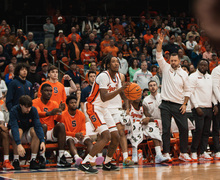Kickers dabble in spring odd jobs
It’s tough to keep track of Collin Barber. The senior kicker on the Syracuse football team is a difficult man to find during spring practices. One minute he’s playing quarterback against the SU defense. The next minute he’s lined up at wide receiver. Opposite him, playing the other wideout position is sophomore punter Brendan Carney.
But don’t lose track of Barber. Turn away for just a few seconds and he’s gone. Now he’s in the Carrier Dome bleachers searching for footballs that SU’s other kickers have booted into the stands. If one’s launched into the upper deck? Tough – someone’s got to get it.
Before you know it, Barber’s back on the field stretching or jogging. Oh yeah, he fits in some kicking, too. Though kickers may be tough to follow during a typical practice, their workout is far from unstructured. Head coach Paul Pasqualoni said the kickers have an exact program which they follow during practice. It’s a program that developed both Barber and Carney into second team All-Big East performers last season.
‘It’s a unique situation,’ special teams coach Chris Rippon said. ‘They have to understand that they’re football players. Their position is kicker, but they have the same responsibility that every player on the team has.’
The day for SU’s four kickers – Barber, Carney, sophomore Ricky Krautman and senior Jeremy Snyder – begins before the rest of SU to allow them some extra work. Especially when the Orangemen practice in the Carrier Dome, the kickers are limited by space and have little time to practice on the uprights. When SU practices outside Manley Field House, there’s an extra practice field the kickers use while the rest of the team practices drills.
The kickers all spend most of practices without any direct supervision from a coach. Rippon spends a lot of time with them outside of practice watching film and helping them improve their techniques. But during practice, Rippon spends a majority of his time working with the safeties.
‘There are points when I wish I had (a coach there) when I’m like, ‘What’d I do on that?” Barber said. ‘We work with each other because you can’t always tell what you did wrong by yourself.’
Thirty minutes before practice begins, the kickers take the field and warm up before taking part in a pre-practice special teams session. They then stretch with the rest of the team and spend the first two periods of practice – each spring practice consists of 24, five-minute periods – helping the defense. Next is stretching for two or three periods before spending 15 minutes helping the safeties. Finally, in period 11, they get a chance to kick before more stretching. At the end of practice, they warm down and jog.
Relatively little time is actually spent kicking because too much kicking can be harmful to long-term success. Instead, a lot of time is spent stretching, especially working the abs, something that can help improve kicking.
While Carney admitted that at times practice can get boring because of the down time, the kickers find plenty on non-kicking related items to keep them busy. Serving as offensive players to help in defensive drills is one of their main tasks. They have to run a play given to them by a coach correctly to give the defense solid practice time. Carney said the kickers are much slower than defenders, placing them at a huge disadvantage.
‘We like to think we’re as fast,’ Carney said. ‘We try to put moves on them.’
‘Every once in a while there’ll be a breakdown in coverage,’ Barber joked, ‘and somebody will burn them and they’ll be like, ‘Kicker scored a touchdown.’ We’re not going to run by them. If they mess up, we might sneak one by them.’
The cold, rainy springs of Syracuse have often left the Orangemen confined to the Carrier Dome. This can make for a long three-hour practice for the kickers with little room to kick. They often end up kicking the ball into the bleachers, meaning someone has to climb up and retrieve the balls – a task which they all despise, but share.
Rippon pointed out that the independence the kickers have gives seniors like Barber a chance to assert leadership skills – something which he said Barber has done well this spring. Rippon remembers the 1999 season, when former SU kicker Nate Trout demonstrated enough leadership to be recognized as a captain. He hopes that Barber continues to demonstrate leadership and gets that same chance.
‘To have a kicker as a captain, you always want to strive for that as a position coach,’ Rippon said. ‘As far as what he’s done this year, he’s been a much more serious guy and everybody knows it’s a big year for him. It’s a huge year for him as being part of our team and what he’s thinking about in the future.’
Published on April 13, 2004 at 12:00 pm





